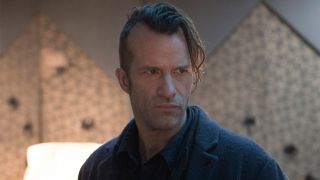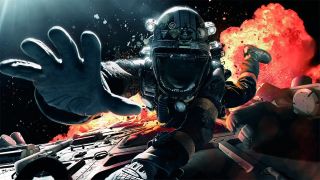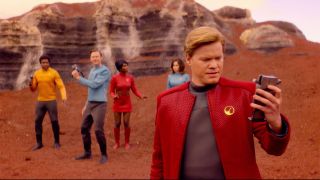The Expanse is the smartest sci-fi series on TV, but its insightful human factor makes it unmissable
Now returning for season 3, The Expanse makes exciting, spacefaring sci-fi feels more like real life than ever before

This week, I find myself badly in need of a haircut, and the prospect is worrying me slightly. Not that I inherently fear such things, you understand. My barber is a trustworthy type, and his establishment far from any local pie shop. I have no worries on that front. Rather, I’m no longer sure I can trust myself to go in for my traditional, moderate tidy-up without spontaneously, at some unpredictable point, yelling at the poor, surprised man to just shave half of it off, unable to control myself. And it’s all Tom Jane’s fault.
Or rather, it’s all The Expanse’s fault. Because in The Expanse’s immaculately constructed, engrossingly real sci-fi world of two centuries hence, shaving half your head is a pretty standard haircut option, and damn, does Tom Jane in particular pull it off. Problem is that The Expanse - returning for its third season on Syfy this week, hence being so readily on my mind - is such a wonderfully realised, affectingly believable, deceptively smart, and really damn engrossing show that it’s far too easy to forget that you’re watching a piece of speculative fiction. It all becomes very tangible and very plausible, very quickly, and then you naturally, in no time at all, find yourself pondering a really inappropriate follicular look for the changeable spring weather.

You see, The Expanse is far from the standard-issue space show perhaps indicated by its generic posters of starfields and dramatic gazes. By setting its scope smaller – despite its name – and concentrating on detail rather than spectacle, it crafts a far more absorbing, far more human experience than most. There are no messianic, hyperadvanced alien civilisations here. There are no rayguns or teleporters, and the show’s – admittedly brilliant – ship-to-ship battles are less concerned with showcasing sustained, balletic dogfights than they are explaining quickly, in no uncertain or romanticised terms, what really happens when you hit a spaceship with a barrage of rockets (spoiler: Everyone gets to the lifeboats really fast or they die).
In fact, almost as dangerous as space fighting is the simple matter of changing course too quickly. If you realise you’ve left the gas on at home, you’d better strap yourself down and put in a gum-shield before you even think about making that quick about-turn. Gravity, it turns out, really hurts.
But it isn’t just the disappointingly mundane tech that, ironically, makes The Expanse so excitingly scary a world to inhabit. It’s really about the way that its believably half-arsed, just-about-fit-for-purpose future affects those trying to live in it. Without any fantastical, technological leaps forward, humanity has just about managed to explore the solar system, meaning that aside from Earth and the eternally delayed promise of a terraformed Mars, we have nothing but rocks to live on. And in.

Earth is relatively plush, enjoying the fruits of the colonies and such decadent delights as a stable atmosphere and fresh water, while those further out are enjoying precisely nothing. Chiefly, those mining the asteroid belt work endlessly to recover ice and ore for the Earthers, the benefit of which they’ll never feel themselves. They live in the permanent, subterranean evening of pressure-cooker space stations, pressed down upon by flat, flickering, LCD skies. Many have never left, and many more never will, generations in low-gravity effecting physiological changes that would make life on their species’ mother-planet agony, were they ever to be able to afford the trip. Mars? Those guys are freer, and much better equipped, but they’re equally pissed off, long-denied the world they were promised, and now asserting ferocious independence amid the smouldering of interplanetary civil war.

The best new TV shows coming in 2018 - from Legion to Westworld
While I say that The Expanse has no aliens, in truth, it has the best aliens on TV. However bumpy the foreheads of Star Trek, or spindly and sinister The X-Files’ scheming bobble-heads, none can match up to the resonant unease of The Expanse’s off-world civilisations. Because the thing with fictional aliens – and sci-fi in general – is that more often than not, their point is to highlight and reflect different elements, versions, and possible versions of ourselves within the safely disconnected, narrative petri dish of fictional metaphor. But where Trek in all its flavours will often deliver new planets and peoples as lumpy analogues for a whole host of contemporary social issues, The Expanse goes one better.
Sign up to the SFX Newsletter
Get sneak previews, exclusive competitions and details of special events each month!
It strips away the pretense and delivers a whole lot of dirty human truth without the polite veneer of extraterrestrial otherness. The Belters and Martians aren’t easy-to-ignore moral lessons, separated from reality by latex and funny voices. They’re people, just like the ones you already know, reacting with painful believability to emergent situations that, for all their off-world settings, are similarly grounded – in their workings and causes - in standard-issue human crapness. Same shit, different century, basically. The rich are self-involved and disconnected, served by a largely unseen underclass who work their arses off for the reward of just hanging on. Everyone feels let down by someone else, and resentment, selfishness, and suspicion are constantly in the way of a healthy dialogue.

The true discussion of alienness in The Expanse comes not from green-skinned marauders, but in unspoken, implicit depiction of how easy it is to dehumanise what you can’t see. It’s a show not about how we discover aliens, but how we make them through our distanced, biased perception of each other. The structures and mechanics of human society might have moved on slightly, but its problems are all caused by the same interpersonal human failings that have always caused them. It’s less science fiction, really, more future history.
But there’s no heavy-handed moralising in The Expanse. No idealistic flag-waving, just a sober exploration of the reality. And here’s where The Expanse’s obsession with detail really comes into its own. Initially focused around a small, very personal detective story triggered by a disappearance – though also taking in multiple, inter-threading narratives across the length and breadth of the solar system, as is the way of all good mysteries – The Expanse’s first season isn’t satisfied to simply weave this material into a wider, more nuanced look at how its world works. It executes that aim marvellously, of course, and that success alone would be enough to make it a great show. But at every stage - even as the scope of the story expands via slow-motion explosion to take in a much bigger political sweep, particularly in season 2 - The Expanse is at pains to show the human effect below the logistical. This is what will first draw you in. Later, it will ensure that you can’t pull yourself away.
The writing and cast are universally strong, but serious plaudits have to be hurled with arm-flailing force at Tom Jane, as downtrodden Belter cop turned obsessive crusader Miller. Initially defined only by a deeply unnecessary hat and a surly demeanour, in truth Miller is one of the most gratifyingly granular characters on TV. His early signature garment, for so long a running, season 1 joke among his colleagues and few friends, is actually somewhat of a totem for the hopes and dreams of a much more layered character, one who - with his forcibly hardened exterior and apparent loyalties of necessity masking a fragile, almost childlike dreamer and idealist - represents a microcosm for the conceits of the whole show.

That hat might give him the look of a clichéd, noir detective, but it’s really the external representation of a sensitive soul locked in a cynical, synthetic construct, who wants nothing more than to feel real wind and rain on his face. This is all eventually distilled into one beautifully underplayed, but highly potent, moment of dialogue late in the first season, but the nuanced layers underpinning Miller’s true nature, and that of The Expanse in totality, are hidden in plain sight during each and every episode, leading to some painful (and beautiful) moments of quietly intense human drama in season 2.

The 25 best shows on Netflix (April 2018)
There’s much more to talk about. There’s the deceptively clever world-building, which lays out a couple of hundred years of Earth history in the briefest of visual notes, such as a gleaming New York fronted by a Statue of Liberty enshrined by a flood barrier, holding back a sea that would otherwise lap around her ankles. There’s the direction, which emphasises the differences between The Expanse’s various human habitats with quietly emotive power, contrasting the omnipresent walls and ceilings of the Belt with deliberately breezy snowfields, open skies, and high-rise, cityscape vistas back ‘home’.
And just as importantly, there’s the thread of hope that runs through all of the turmoil, the insistence that although the political and business machine may grind on, fuelled by the bodies of exploited workers and manipulated military, as readily as it ever has, the steady march of social progress – at least on Earth – continues. The matter-of-fact, same-sex marriage of a high-ranking politician here. A many-parented family unit there. The multinational melting pot of the Belt, its sterile environment contrasting with a vibrantly evolving culture, right down to its own language made of the slang and vernacular of every country on Earth.

But I’ll explain things no further. Because The Expanse, really, is a show that you have to directly experience. It’s one part TV drama, one part an actual place to embed in and explore. It’s smart and dense, but just as accessible and exciting. Jump in now, if you haven't. You have a lot of great stuff to catch up on. UK viewers have more time, as season 3 will only hit Netflix after the US broadcast finishes, but don't use that as an excuse because the first two seasons are on the streaming service now. Be good to yourself. Do it today.
Just don’t blame me when you shave your head in a couple of weeks.
Blame Tom Jane. It’s all Tom Jane’s fault.
Most Popular




